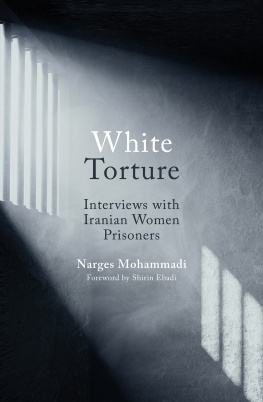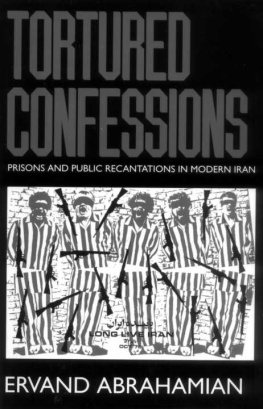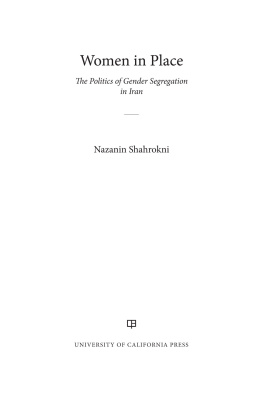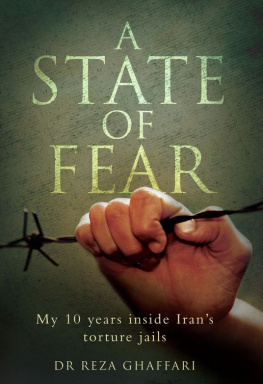ATENA DAEMI
Atena Daemi, a civil rights activist, was arrested on 30 October 2014 by the Intelligence division of Sarollah Camp of IRGC, and transferred to Ward 2A of the IRGC Detention Centre in Evin Prison.
The childrens rights activist was charged with insulting the supreme leader, insulting the sacred, conspiracy to disrupt national security, and concealing evidence of a crime. She was detained in Ward 2A for eighty-six days and then transferred to the womens general ward. Atena was sentenced to five years in prison on charges of conspiracy and two years in prison on charges of insulting the leadership.
What was the condition of your cell?
I was arrested, and then after six hours of inquisition I entered Evin Prison, which I had never thought about before. I was taken past a few doors and then put in a cell. It was about three metres by two metres. There was a window that was high up and had several layers of grilles which completely prevented light from entering the cell, but the blue colour of the sky could still be seen through its holes. Inside the cell, there was a yellow light bulb and a white one, both on the ceiling. When it was time to sleep, they turned off the white light. The walls of the cell were covered with marble up to the height of a human, and the rest was cream-coloured plaster. The cell door was iron and pea-coloured. At the bottom of the door there was a hatch. Id put a strip of paper out to say that I needed to go to the bathroom. The floor of the cell was covered with a thin, machine-made carpet. I had two blankets for sleeping and one blanket to use as a pillow. I was in this cell for about thirty days.
What was the difference between this cell and the next one?
After thirty days I was transferred to a larger cell, which was twice the size of the previous one. From the traces left on the wall, one could guess that two cells had been joined. There was no toilet in the previous cell, but in the new cell there was a toilet that was separated from the rest of the cell by a door. There was a little sugar and salt inside the cell and there were three lights. The window was right up by the ceiling, but instead of opening to outside the building it opened into the corridor, where there was no light or sound. The corridor was pitch black. It was the way to enter and exit Section 2A and the interrogation rooms.
How was your mental and psychological state?
I was arrested in the alley. After searching my fathers house and then my sisters house, they took me to my workplace, and then to my cell. The sound of the door being slammed shut behind me devastated me. I knew I had been deprived of the right to control my own life.
It was crushing. There was absolute silence. I turned and looked at the closed door. I felt trapped inside a matchbox. I thought that this door would not open, except by the request of the interrogator. After each interrogation I said to myself, Maybe I will be interrogated tomorrow and maybe not. I felt conflicted. You didnt know which one youd prefer; that they opened the door and interrogated you, or that they locked it forever without interrogating you. The first night, when one of the lights went out, I subconsciously jumped up and called out to them, asking what they were doing. Silence, they said. Sleep now!
I heard the morning call to prayer at dawn; I had not slept. I could not sleep. The place was unfamiliar and sickening to me. It was the first time in my life that I was not at home with my parents. I didnt know what had happened to them and what they were doing. I didnt know what would happen tomorrow. I wanted to smoke but they wouldnt give me a cigarette. There was nothing to entertain you, not even for a minute. I was always waiting for something to happen. I was oblivious to everything and everyone. Everything was vague and undecided. The wait was deadly. In solitary confinement its only your mind that works. Sometimes I thought about the issues raised during the interrogation. Sometimes I thought about my reactions to the interrogators behaviour, and I planned accordingly, but eventually there came a time when these thoughts became exhausting. I didnt know what to do.
I liked to sleep and not think about anything, because the truth was bitter enough. Thinking about things and going over them made me even more bitter. That is why I struggled between sleeping and staying awake. I didnt trust anything, and I didnt know what would happen.
What changed the mood, even for a few minutes?
Frequently, I tried to think of things I had taken for granted before my arrest. It was very curious that I missed all of them. I tried to dissect the past. I tried to remember the books I had read or my favourite songs. The first few days I thought no one could hear me. One day the sound of banging on the wall caught my attention. It was an eerie sound, but at least it was a sound that had broken the silence. I realized that there was someone on the other side of the wall. I jumped up and tried to communicate with those around me in other cells. I did the same thing when I was taken outside for open air hour. Either way, I made my presence known. This encouraged other prisoners to do the same. All of this was fun and entertaining for a few minutes only. There was nothing in the cell to change the atmosphere.
Everything was uniform and monotonous. In the cell, especially at night, I heard loud noises. I didnt know why men shouted. I felt like they were torturing someone. It was a bad feeling. Fear, worry and sadness consumed my whole being and the cell space became more unfamiliar and unfathomable. I later found out that it was the voices of the soldiers of Evin Prison who were calling each other from the watchtowers. As I laid my head on the floor, I heard a man crying from downstairs. I grew disconsolate. I tried to show him that he was not alone by knocking on the wall. He would notice and then not only did the sound of crying stop, but he also knocked in response.
The sound of the call to prayer in that ward was different from any others I had ever heard. This call to prayer and the way it was made was like the trumpet of death. It made me feel bad. I was in the cell during Muharram. The sound of noha , crying and mourning, was played loudly every day in the ward, which strangely disturbed me.
How was the food?
They gave me bread, cheese and tea for breakfast. Sometimes they would give me milk or a piece of fruit at eleven oclock. We had lunch at noon. In Ward 2A prisoners fresh-air hour was once in the morning and once in the evening. Most days, as it was cold, they took me out only in the afternoon. Afterwards they would give me tea and then dinner at about six oclock, which was usually something to eat with bread. Bedtime was eleven oclock at night. I had no appetite but I just had to eat.
Were you arraigned immediately after the arrest?
The day I was arrested and transferred to the prison, I was taken for interrogation after changing and giving my clothes to the prison guards. I had not even seen my cell, which was two floors below. I entered a very small room that only had room for one chair. In front of the chair there was a one-way mirror.
When the door was closed, no sound came in or went out. Then the interrogation started. They brought my friend S and kept her next to them. I heard and recognized the voice. They wanted to show me that my friends had also been arrested. Early the next morning they took me to the courthouse and kept me in the prayer room. I even ate lunch there. I was there until evening. The courthouse was closed, and I was taken into the corridor. We waited there until ten oclock, when they took me to the office of an interrogator named Khorshidi. The interrogator of my case and another person who spoke in a strong Gilaki accent were there. My interrogator read the charges and handed me the form. I think eighteen to twenty charges were listed: acting against national security, association and collusion, blasphemy, etc. I was constantly threatened with execution while reading the form.
Next page







